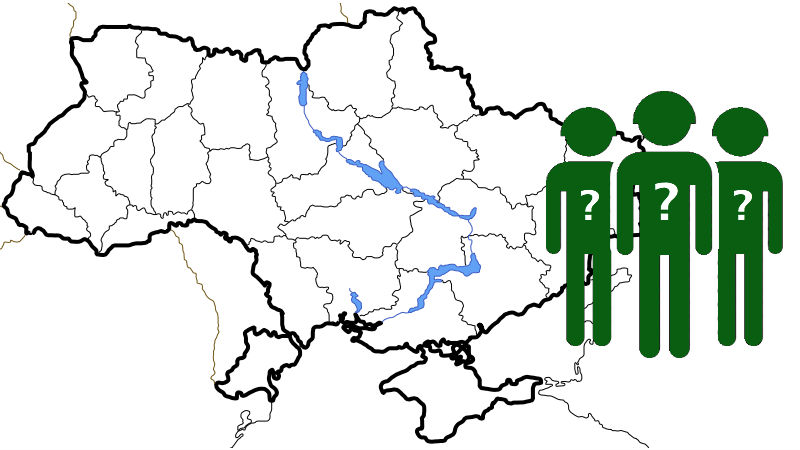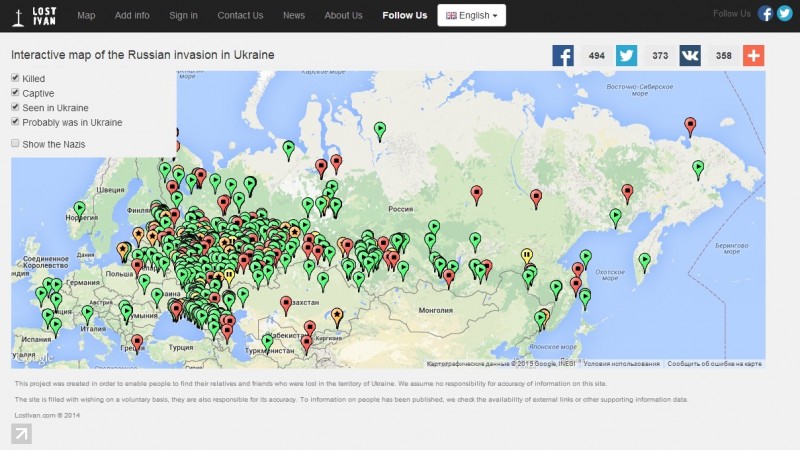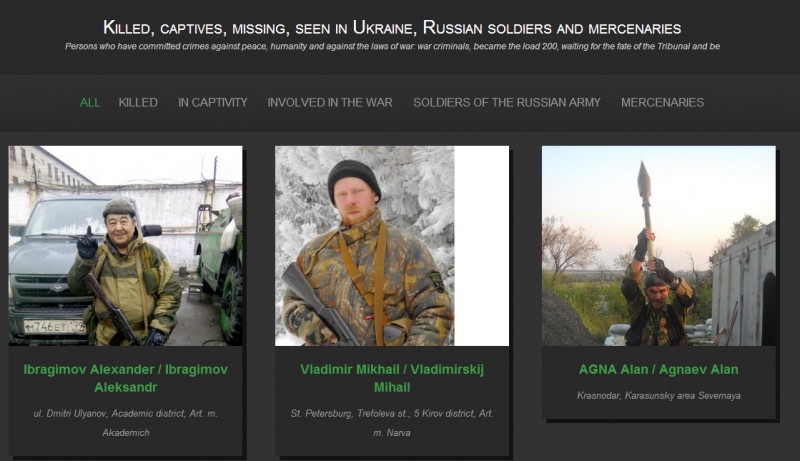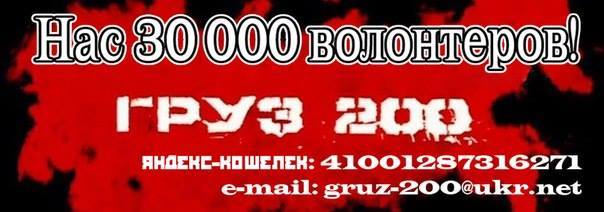
Images mixed by Tetyana Lokot.
This is the second in a series of posts where RuNet Echo talks to the people behind several fact-checking projects in eastern Ukraine. Read the first post here.
From its onset almost a year ago, the conflict in eastern Ukraine has been surrounded by controversy and a full-scale information war waged both in the mainstream media and online. The most heated debates have centered on the nature and origins of the conflict, as well as the sources of weaponry and manpower supplied to the pro-Russian separatist forces of self-proclaimed Donetsk and Luhansk people’s republics.
While Putin has recently admitted the presence of Russian troops and special forces in Crimea before the referendum, Russian state-controlled media have continuously denied the presence of regular army units in eastern Ukraine, insisting that any Russian nationals who may have joined the separatists had done so of their own free will. At the same time, Kyiv has repeatedly accused Moscow of aiding the rebel forces with both equipment and regular military personnel, as well as coordinating their maneuvers from the Kremlin.
As the information warfare rages on, journalists and activists are left with the job of fact-checking official accounts from both sides by painstakingly collecting and corroborating publicly available data. RuNet Echo has previously reported about some of the projects that focus on collecting and verifying information about the origins and whereabouts of military equipment in the conflict area. There are a number of initiatives, however, that focus on tracking down information about specific individuals fighting in Donbas.
Most of these projects are run by volunteers and rely largely on crowdsourced efforts to collect and verify video and photographic content. They are rarely set up by professional journalists and do not receive any support from the state, believing that this allows them to be more independent in their search for facts. At the same time, their founders are often driven by their own political views and perceptions of the conflict.
Lost Ivan

A screenshot from the Lost Ivan website. March 14, 2015.
The project's name, Lost Ivan, seems to have been inspired by an August 2014 incident, when Moscow claimed its paratroopers captured on Ukraine’s territory simply “got lost.” The initiative collects photo and video evidence, as well as other materials on the whereabouts of “Russian soldiers, mercenaries, and terrorists spotted in Ukraine,” as well as Ukrainian supporters of the separatists.
The majority of the data is derived from social network accounts, but some photos and documents are passed to the site’s administrators directly from the frontlines. According to the project's creator, Vladimir, they have made friends among the military after deciding to convert the profit derived from advertising on the site into UAVs and other equipment for the Ukrainian army. At the same time, due to its attempts to reflect “the real situation,” the site's administrators admit facing occasional criticism from those Ukrainians who “blindly believe the President and the [Military] Command Headquarters.”
Since its foundation, Lost Ivan has collected over 3,040 records, and can boast content in nine languages, as well as coverage in independent Russian and Western media.
Идея создать ресурс появилась когда перед днем независимости Украины массово вошла российская армия в районе Иловайска, тогда же взяли в плен первых российских десантников вместе с техникой, и информация появилась в сети. Но как она появилась, так и начала сразу пропадать, на всех форумах сразу удаляли любое упоминание об этой теме.
Потому я, как программист с более чем 5-летним стажем разработки сайтов, решил набросать за пару минут простенький сайт, в результате через 3 дня существования сайта посещаемось достигла порядка 250 000 в сутки.
The idea to create this site came right before Ukraine’s Independence Day (August 24, 2014—GV), when the regular Russian army had entered Ukraine en masse near Ilovaisk, and the first Russian paratroopers were captured, along with their equipment. That is when the first information appeared online. But it also began to disappear right away—on all forums the comments dedicated to this topic were deleted immediately.
As a programmer with over 5 years of website design experience, I decided to set up a simple website, but as a result within three days it reached about 250,000 daily views.
At present Lost Ivan is run by three people, two of whom deal exclusively with collecting and verifying the content. LostIvan’s creator Vladimir told RuNet Echo that the site was “in no way” created to delight in Russia’s losses, but rather to “collect evidence for Putin’s trial in the Hague, debunk Russian propaganda, and normalise relations between the two countries.” However, Vladimir admits that he has not been very successful in achieving this last goal, as many Russian users respond to website’s content with aggression. “All but the relatives of the soldiers gone missing [in Ukraine]—with them we have a good rapport.”
Gruz 200
Gruz200 (“Cargo 200″—a Russian military code name for casualties to be transported from the battlefield—GV) is an online database of “Russian soldiers and mercenaries that have been killed, were taken into captivity, have gone missing, or have been otherwise spotted in Ukraine.” Most of the data for Gruz 200 comes from social networks, news portals, blogs, and through exchange of information with similar projects. Some reports are also crowdsourced from the website's users.

A screenshot from the Gruz 200 website. March 13, 2015.
The website was created and is maintained by one anonymous volunteer. He told RuNet Echo he was an active participant of Euromaidan and provided information support for the protest on social media, so he saw a natural need to do the same during the conflict.
Когда началась уже прямая агрессия России в Украину, было принято решение запустить gruz200.net с целью внесения лепты в противодействие российской пропаганде, которая всячески отрицала на тот момент участие российской армии и граждан России в разжигании конфликта в Украине. Проект ставит перед собой несколько целей:
– показать количество подтвержденных фактов гибели российских незаконных комбатантов;
– собрать базу и максимально распространить имена военных преступников для их преследования сейчас и в будущем;
– по возможности приостановить пополнение рядов российских наемников в Украине людьми, ставшими жертвами пропаганды.
When the direct aggression of Russia against Ukraine began, I decided to launch Gruz200.net to contribute to debunking Russian propaganda, which actively denied the involvement of Russian citizens and Russian military in fueling the conflict in Ukraine. The project has several objectives:
– to demonstrate the number of verified instances of death of Russian illegal combatants;
– to compile a database and disseminate the names of war criminals as widely as possible to enable their prosecution now and in the future;
– if possible, to stop the influx of Russians that fell victims to the propaganda into Ukraine [and came here] as mercenaries.
The administrator of Gruz200 notes that he supports neither the current “clannish-oligarchical” Ukrainian government, nor the “Soviet-style KGB-based” Russian state, but sides with Ukraine and its people. He admits that his project is “a drop in the ocean” when it comes to countering massive Russian television and print propaganda, yet he hopes that the more such projects work to expose the lies of the Kremlin the sooner “Putin’s regime will fall.”
Cargo 200 from Ukraine to Russia
Ukrainian activists and social media users are not the only ones collecting information about the militants fighting in eastern Ukraine. Russian human rights activist Elena Vasiljeva was one of the first to speak out about the Russia's involvement in Ukraine and communicate with the relatives of Russian soldiers killed in Donbas.

A cover page of a Facebook group “Cargo 200 from Ukraine to Russia.” The caption reads: “We are 30,000 volunteers.” March 13, 2015.
Neither a programmer nor an IT-specialist, Vasiljeva created a public Facebook group called “Cargo 200 from Ukraine to Russia” in August 2014. The page accumulated eight thousand participants in the first week after its registration. At the moment of writing it has 29,335 members, many of whom are concerned relatives of Russian militarymen. They volunteer their time to collect information about Russian soldiers that have been killed in Ukraine derived from open sources, such as media reports or social media.
As a long-term member of a veterans’ organization, Vasiljeva says her chief concern is with the fate of the soldiers that have been sent to the “undeclared war” in Ukraine and their families. On her blog, she writes:
Мало того, что российских военных, контрактников послали воевать, но и подготовили все условия для того, чтобы потом презреть их в собственном государстве, сделать нищими калеками, обрекают десятки тысяч семей на горе и страдания.
As if it is not enough for the Russian military—contract soldiers—to be sent to war, [the authorities] have prepared all conditions for those who return to be later denounced in their own country and turned into disabled beggars, thus condemning tens of thousands of families to grief and suffering.








7 comments
haga clic aquí para leer
Outing the Russian Military in Eastern Ukraine · Global Voices
It looks to me as though a lot has been omitted from this site’s coverage of the Ukraine civil war: 1) the fact that the present puppet govt in Kiev was chosen and installed by Asst. Sec. of State Nuland with the assistance of Blackwater mercenaries and the CIA 2) the fact that CIA Dir. Brennan was seen in Kiev directly the puppet govt. was installed to order the launching of the civil war 3) the fact that, except for ten honorable Reps, the entire US Congress has voted for a new Cold War against Russia 4)the fact that Kiev’s army has been trounced by the Separatists, which is why Poroshenko is whining for money and lethal aid from the US/EU 5) the fact that Ukraine’s economy and banking system are in meltdown 6) the fact that mercenaries are being used on both sides 7) the fact that the neo-Nazi units (composed entirely of nazis) stated clearly that they would not abide by the Minski II ceasefire 8) the fact that the VP’s son, Hunter Biden sits on the board of Naftogaz while western corporations are stripping Western Ukraine of its resources and NATO builds ABM sites aimed at Russia, preparatory for WWIII 9) the fact that the first Pres. Bush promised M. Gorbachev in 1991 (in return for allowing German unification) that NATO would not move “one inch” toward Russia’s borders, a promise repeatedly violated since then. 10) the fact that Dubya cancelled the ABM Treaty, which was the preventive linch-pin needed to keep WWIII from breaking out. 11) the fact that nearly the entire western media has marched in lockstep to ignore all US behavior in Kiev and to constantly repeat their mantra of “Russian aggression.”
Thanks Tetyana Bohdanova and Global Voices.
Part of the incredible civilian push-back against Russia’s war on Ukraine has included the work of Russian, Ukrainian and European bloggers who have outed the Kremlin’s responsibility for the killings in Ukraine.
Other important initiatives have included:
– Bellingcat Ukraine: https://www.bellingcat.com/tag/ukraine/
– Ukraine at War: http://ukraineatwar.blogspot.ca/
– Live UA Map: http://liveuamap.com/
Keep up the good work to help Ukraine!
.
Thank you for the links, John!
My colleague actually interviewed Live UA Map co-founder and editor in a previous post dedicated to fact checking the conflict in Eastern Ukraine. You can read it here: http://globalvoicesonline.org/2015/03/03/fact-checking-the-conflict-in-eastern-ukraine/
http://www.bbc.com/news/world-europe-31962644
PooTin trolls at work.